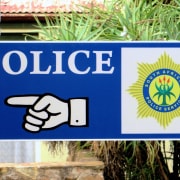|
Getting your Trinity Audio player ready...
|
Image: GroundUp
A year ago we reported that the Western Cape (WC) police ombud Oswald Reddy had been requested to investigate allegations that police members and gang members in the province were in cahoots. This followed a biting Western Cape High Court judgment in a case involving the 28s gang, delivered on 17 October 2022, which referred to evidence that gang members had infiltrated the top management structures of the South African Police Service (SAPS) in that province.
Handing down the judgment, Judge Daniel Thulare noted evidence that low-ranking officers had been captured – as well as their seniors – “to the extent that the 28s gang has access to the table where the provincial commissioner of the SAPS in the Western Cape sits with his senior managers and leads them in the study of crime, develops crime prevention strategies, and decides on tactics and approach to the safety and security of inhabitants of the Western Cape.”
This illegal access to police information, Thulare said, included “penetration of and access to the sanctity of the reports by specialised units like the Anti-Gang Unit and Crime Intelligence, to the provincial commissioner.”
WC premier Alan Winde said at the time: “This judgment has highlighted alleged horrific and deep-rooted corruption and collusion between the SAPS and members of the so-called 28s gang.”
Because they may have been accessing key documents and strategies on crime fighting, one suggested consequence that was that the possession of such intel was actively helping gang members to avoid the law.
Allegations confirmed
Reddy, a retired major-general, completed his investigation in late November 2022, and his findings corroborated the court’s statements.
Now, a new initiative, launched in October 2023 by the Global Initiative Against Transnational Organized Crime (GI-TOC), focuses on further developments in this sphere in the Western Cape. It references the Thulare judgment and confirms the situation described by the judge and the police ombud, saying that its own research has found the same dynamics in place.
The first issue of the Western Cape Gang Monitor (WCGM), released in October, is based on research by the GI-TOC Observatory of Organized Crime in South Africa (SA-Obs). It kicks off a series of bulletins which will be published quarterly, “to provide a concise synthesis of relevant trends to inform policymakers and civil society”.
The WCGM, adds GI-TOC, draws on information provided by field researchers working in gang-affected communities in the provincec. “This includes interviews with current and former gang members, civil society, and members of the criminal justice system.”
Gang violence has intensified in the area, and one of the key findings of the WCGM’s first edition is an increase in infighting between splinter groups within gangs, leaving citizens often caught in the crossfire. This steady fragmentation of gangs is a critical trend to monitor, as it adds a new layer of complexity – and unpredictability – to gang behaviour.
The WCGM notes that gangs are diversifying their activities and exploiting more sources of income. During the Covid lockdown, gangs used the illicit tobacco and alcohol markets as lucrative sources of income. In recent times, they have set their sights on the construction industry.
“Extortion carried out at construction sites, for example, has become more widespread across the province (although this practice has long been part of the fabric of life in communities where gangs operate). Gangs have closed in on municipal contracts for school or road construction, and the like, and forced contractors into paying ‘protection’ fees.”
The so-called construction mafia have struck in other provinces and to date, not much has been done to secure the safety of workers and ensure that public money is used to uplift communities rather than enrich criminals. Gangs also extort money from foreign shop owners, collect protection money from the taxi industry, and have even got involved in copper theft.
“Gang members and observers in the criminal justice system have described how gangs have become much more entrepreneurial in recent years. Mid- and lower-ranking gang members have become involved in their own criminal money-spinning sidelines, unauthorised by their leaders. This has driven gang diversification into more criminal markets and extortion rackets. Their behaviour is now, more than ever, driven by financial gain, displacing once honoured traditional gang codes and norms.”
WC criminal justice system weakened
In his judgment, Thulare spoke of evidence that “the 28s gang and the Mobsters in particular are breathing heavily on the necks of public prosecutors who guide the investigation of organised crime and institute criminal proceedings against its members”.
These prosecutors, he said, live under a constant and permanent threat to their lives and those of their close families. “The evidence also shows that the Mobsters have now moved gear upwards and are interfering with the decorum of the courts and the independence of judicial officers, and testing the judicial oath of office, especially the term ‘without fear’.”
And indeed, the WCGM discusses “systemic issues in the criminal justice system”, which hinder the response to gangs. Severely depleted during the state capture era, the criminal justice system of today’s South Africa is struggling when it comes to prosecuting perpetrators of gang violence in the Western Cape.
“Many prominent gang leaders stand accused in cases at the Western Cape High Court. Yet these cases are mired in delays and overwhelm the workload of judges, investigators, and prosecutors. The Western Cape judiciary stated in August 2023 that complex, high-profile gang-related cases are contributing to a case backlog in the High Court. The consequent delays make the prosecution’s work more challenging as evidence deteriorates or is lost and witnesses withdraw or die.”
Meanwhile, victims wait hopelessly for justice.
Inability to successfully secure convictions
The WCGM cites the high-profile murder trial of alleged gang leaders Jerome Booysen and Mark Lifman – this was postponed from July 2023 to 2024, as the Western Cape High Court did not have an available judge. Another case was postponed to 2025, and they are just two examples among several.
“These major cases are indicative of a broader problem,” says the WCGM, and that is “the inability to secure prosecutions of gang-related offences. The conviction rate for gang violence in the province is just 2–3%, according to figures from May 2022.”
Furthermore, research conducted in the Cape Town suburb of Grassy Park showed that the community is angered and frustrated by impunity in gang-related cases. They are just one of many communities experiencing the same frustration. “The same shooters are used by gangs for multiple killings with impunity, as even if they are arrested these gang members are often swiftly released, either with charges dropped or bail granted.”
Factors contributing to this situation include intimidation of witnesses, police corruption, an unmanageable caseload of investigating officers, and incompatible priorities between the police and the court system. In the meantime, communities are at risk of further violence.
Corroborating Judge Thulare’s sentiments, the WCGM notes the impact of corruption “which has reached even the highest echelons of the Western Cape policing structures”, describing it as a “major issue”. Researchers from SA-Obs have gang sources on record as saying (in interviews) that “corruption of police and government officials has become ever-more normalised across many gang-affected areas”.
As a result, the Cape Town Metro Police and SAPS are distrustful of each other, and this discourages co-operation and frustrates effective investigations into gang activity.
With little meaningful action against gangs and no relief for communities ravaged by gang violence in recent years, the situation looks bleak indeed. But the WCGM hopes to provide a reliable source of information which will provide up-to-date trends and dynamics in gang behaviour, allowing the government to respond effectively and sustainably.








